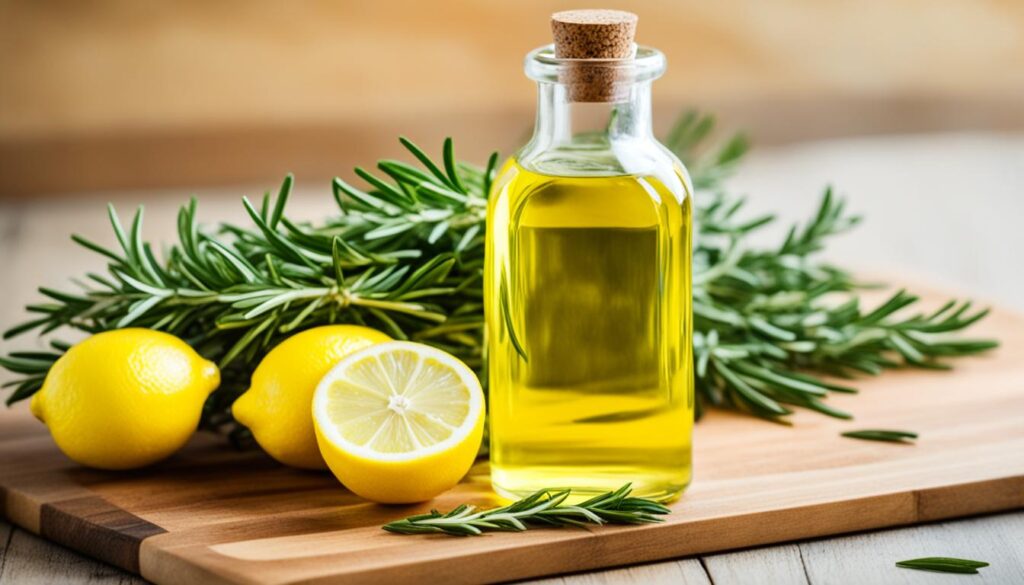Are you ready to experience the benefits of homemade lemon oil? In this guide, I’ll show you how to make your own lemon oil at home using simple ingredients and equipment. Whether you’re interested in using it for skincare, hair care, or various other purposes, making lemon oil yourself is a cost-effective and rewarding option.
Key Takeaways:
- Learn how to make lemon oil at home with easy-to-follow steps.
- Lemon oil offers numerous benefits for the skin, hair, and overall well-being.
- There are different methods to extract lemon oil, such as the cold method and the hot method.
- Proper storage is essential to extend the shelf life of homemade lemon oil.
- Lemon oil can be used for skincare, hair care, household cleaning, and aromatherapy purposes.
What is Lemon Oil?
Lemon oil is an essential oil that is extracted from the peel of lemons. It is a versatile oil that can be made at home using various methods, resulting in homemade lemon oil. This DIY version is a milder alternative to commercially produced essential oils, making it suitable for a wide range of applications.
Did you know? Lemon oil has been used for centuries due to its refreshing scent and numerous benefits for the mind and body.
Homemade lemon oil can be used for cooking, cleaning, and skincare purposes, making it a popular choice among enthusiasts of natural remedies and DIY projects. Whether you want to enhance the flavor of your dishes, freshen up your home, or improve your skincare routine, homemade lemon oil is a cost-effective and customizable solution.
“Homemade lemon oil is a great way to harness the natural power of lemons and elevate your everyday experiences.”
Benefits of Homemade Lemon Oil
Homemade lemon oil offers numerous benefits for various uses:
- As a cooking ingredient, it adds a citrusy flavor to dishes, desserts, and beverages.
- When used in cleaning solutions, it acts as a natural degreaser and leaves a fresh scent.
- In skincare, it can improve the appearance of acne, lighten dark spots, and moisturize the skin.
- Lemon oil can also be used in hair care to promote hair growth and reduce dandruff.
With its refreshing aroma and versatile properties, homemade lemon oil is a valuable addition to any household.

Now that you understand what lemon oil is and its potential benefits, let’s explore how you can make your own homemade lemon oil at home in the next section.
How to Make Lemon Oil at Home
Making lemon oil at home is a simple and rewarding process that allows you to enjoy the benefits of this versatile essential oil. There are two popular methods for creating homemade lemon oil: the cold method and the hot method. Let’s explore each technique in detail:
The Cold Method
In this method, you’ll need lemons, carrier oil, and a jar for infusion. Follow these steps:
- Start by peeling the lemons, being careful to remove only the yellow zest and leave the bitter white pith behind.
- Place the lemon peels in a clean jar, ensuring they are completely dry.
- Add your chosen carrier oil to the jar, covering the peels completely. Common carrier oils include olive oil, almond oil, or jojoba oil.
- Seal the jar tightly and store it in a cool, dark place for two weeks, allowing the lemon peels to infuse into the oil.
- After two weeks, strain the oil to remove the lemon peels, and transfer the infused lemon oil into a clean, airtight container for storage.
The cold method allows the lemon essence to slowly infuse into the carrier oil, resulting in a fragrant and flavorful homemade lemon oil.
The Hot Method
If you prefer a quicker option, the hot method is ideal. Here’s how to make lemon oil using this technique:
- Gather your lemon peels and carrier oil of choice.
- In a saucepan, combine the lemon peels and carrier oil and heat the mixture over low heat.
- Simmer the mixture for 1-2 hours, stirring occasionally to prevent burning.
- Allow the oil to cool before straining it to remove the lemon peels.
- Transfer the strained lemon oil into a clean, airtight container for storage.
The hot method accelerates the infusion process by using heat, resulting in a homemade lemon oil with a vibrant aroma and flavor.
Now that you know how to make lemon oil at home using both the cold and hot methods, you can experiment with different carrier oils and enjoy the benefits of this natural and versatile essential oil. Whether you choose the slow infusion of the cold method or the quicker extraction of the hot method, your homemade lemon oil is ready to bring a refreshing citrus touch to your culinary creations, skincare routine, or household cleaning.
Table: Comparison of Cold Method vs. Hot Method for Making Lemon Oil
| Method | Time Required | Infusion Result |
|---|---|---|
| Cold Method | Two weeks | Slow and gradual infusion |
| Hot Method | 1-2 hours | Quick and intense infusion |
How Long Does Homemade Lemon Oil Last?
A homemade lemon oil can be a versatile and beneficial addition to your skincare, cooking, and cleaning routines. But how long can you expect your homemade lemon oil to stay fresh and potent? Storing your lemon oil correctly is crucial to ensure its shelf life and maintain its quality.
Proper Storage for Homemade Lemon Oil
To maximize the shelf life of your homemade lemon oil, follow these storage tips:
- Store it in a cool and dark place: Direct sunlight and heat can cause the oil to degrade and lose its potency. Find a cool spot in your pantry or cupboard away from any heat sources.
- Airtight containers: Use airtight glass containers or jars to store your lemon oil. This prevents air and moisture from compromising the quality and freshness of the oil.
- Refrigerate for longer shelf life: For even better preservation, you can store your homemade lemon oil in the refrigerator. The cool temperature helps slow down the oxidation process and extend the shelf life.
By following these storage practices, you can enjoy the benefits of your homemade lemon oil for an extended period.

Lemon Oil Uses
Lemon oil is a versatile essential oil that offers numerous uses and benefits. Whether it’s for skincare, hair care, household cleaning, or aromatherapy, lemon oil can be a valuable addition to your self-care and wellness routine.
Skincare
When it comes to skincare, lemon oil has properties that can help with various concerns. It can be used to:
- Treat acne: Lemon oil’s antimicrobial properties can help reduce acne-causing bacteria.
- Lighten dark spots: Lemon oil’s natural bleaching effect can fade dark spots and hyperpigmentation.
- Moisturize the skin: Lemon oil’s hydrating properties can keep the skin nourished and supple.
Hair Care
Lemon oil can also benefit your hair in several ways. It can:
- Promote hair growth: Lemon oil can stimulate hair follicles and encourage healthy hair growth.
- Reduce dandruff: Lemon oil’s antimicrobial properties can help combat dandruff and alleviate scalp irritation.
- Add shine: Lemon oil’s astringent properties can make your hair look shinier and healthier.
Household Cleaning
In addition to its skincare and hair care benefits, lemon oil is a fantastic ingredient for natural household cleaning. Its antiseptic and antibacterial properties make it an effective cleaner for various surfaces. Whether you’re wiping countertops, cleaning glass, or freshening up your home, lemon oil can be a powerful and refreshing option.
Aromatherapy
Lemon oil’s invigorating and uplifting scent makes it a popular choice for aromatherapy. It can help improve mood, reduce stress, and enhance mental clarity. You can use lemon oil in a diffuser, add a few drops to a bath, or incorporate it into massage oils for a refreshing and revitalizing experience.
Discover the range of uses and benefits of lemon oil, from skincare and hair care to household cleaning and aromatherapy.
| Lemon Oil Uses | Benefits |
|---|---|
| Skincare | Treats acne and lightens dark spots |
| Hair Care | Promotes hair growth and reduces dandruff |
| Household Cleaning | Antiseptic and antibacterial properties for effective cleaning |
| Aromatherapy | Invigorating scent for mood enhancement and stress reduction |
Make the most of lemon oil’s versatility and enjoy its many uses and benefits in your daily life.

Difference Between Lemon Oil and Lemon Juice
When it comes to lemons, both the oil and juice offer unique properties and applications. Let’s explore the key differences between lemon oil and lemon juice to understand their distinct characteristics and benefits.
Source of Extraction
Lemon oil is extracted from the outer peel of lemons, which contains concentrated essential oils. These oils provide the distinct aroma and flavor associated with lemons. On the other hand, lemon juice is derived from the juicy pulp inside the fruit. It is the liquid extracted by squeezing or pressing the lemons.
Potency and Versatility
Lemon oil is highly concentrated and potent, thanks to the extraction process that captures the essential oils. This makes it more versatile in its applications compared to lemon juice. Lemon oil can be used for skincare purposes, aromatherapy, cooking, cleaning, and more. Its concentrated nature allows for a little to go a long way, making it an excellent addition to various recipes and self-care routines.
“Lemon oil is the essence of the lemon fruit, providing a powerful burst of flavor and aroma in a small amount. In contrast, lemon juice offers a more subtle and tangy taste.”
Benefits and Uses
Lemon oil has numerous benefits for the skin, hair, and overall well-being. It is known for its cleansing properties, helping to purify and rejuvenate the skin. Lemon oil can be used to lighten dark spots, reduce acne breakouts, and moisturize the skin. It is also a popular ingredient in hair care products due to its ability to promote hair growth and combat dandruff.
On the other hand, lemon juice is commonly used as a natural remedy for digestive issues and as a refreshing beverage. It is often added to recipes, beverages, and dressings to provide a touch of tanginess and acidity. Lemon juice also contains vitamin C, which is beneficial for the immune system.
Summary
In summary, lemon oil and lemon juice are distinct in terms of their extraction process, potency, and applications. While lemon oil offers concentrated essential oils and a wide range of uses, lemon juice provides tanginess and is commonly used for culinary and digestive purposes.
When choosing between lemon oil and lemon juice, consider the specific benefits and applications you are looking for. Incorporating both into your routine can provide a balanced approach to enjoying the unique properties of lemons.
| Lemon Oil | Lemon Juice |
|---|---|
| Extracted from the outer peel of lemons | Derived from the juicy pulp inside the fruit |
| Concentrated and potent | Subtle and tangy |
| Versatile: skincare, cooking, cleaning, etc. | Commonly used in cooking and beverages |
| Benefits for the skin, hair, and overall well-being | Natural remedy for digestive issues and a source of vitamin C |
Where to Buy Lemon Oil
If you’re looking to purchase lemon oil instead of making it at home, there are several options available to you. It is important to choose a reputable brand to ensure the quality and safety of the essential lemon oil you are buying.
One option is to visit health stores in your area. These stores often carry a variety of essential oils, including lemon oil. You can find lemon oil in different sizes and brands, allowing you to choose the one that best fits your needs.
Another convenient way to purchase lemon oil is through online marketplaces. Many reputable sellers offer a wide selection of essential lemon oil. Make sure to read customer reviews and check the seller’s ratings to ensure a positive buying experience.
Specialized essential oil shops are another great option for buying lemon oil. These stores focus specifically on essential oils and often carry a diverse range of products. They may have knowledgeable staff who can provide guidance on which lemon oil would be best for your intended use.
FAQ
What is lemon oil?
Lemon oil is an essential oil extracted from the peel of lemons. It contains concentrated essential oils and can be used for cooking, cleaning, and skincare purposes.
How can I make lemon oil at home?
To make lemon oil at home, you can use the cold method or the hot method. The cold method involves packing lemon peels in a jar with a carrier oil and allowing them to infuse for two weeks. The hot method involves heating lemon peels and carrier oil together for a shorter amount of time. Both methods result in homemade lemon oil.
How long does homemade lemon oil last?
Homemade lemon oil can last for up to a month if stored properly in a cool, dark place. To extend its shelf life, it is recommended to store the oil in airtight jars and refrigerate it.
What are the uses of lemon oil?
Lemon oil has a wide range of uses. It can be used for skincare purposes such as treating acne, lightening dark spots, and moisturizing the skin. It is also beneficial for hair care, promoting hair growth, and reducing dandruff. Additionally, lemon oil can be used for household cleaning, as a natural insect repellent, and for aromatherapy purposes.
What is the difference between lemon oil and lemon juice?
Lemon oil is extracted from the peel of lemons and contains concentrated essential oils. On the other hand, lemon juice is squeezed from the juicy pulp inside the fruit. Lemon oil is more versatile and potent, offering more benefits for various purposes.
Where can I buy lemon oil?
You can purchase essential lemon oil from various retailers. Look for reputable brands and ensure the oil is safe for the intended use. Lemon essential oil can be found in health stores, online marketplaces, and specialized essential oil shops.






